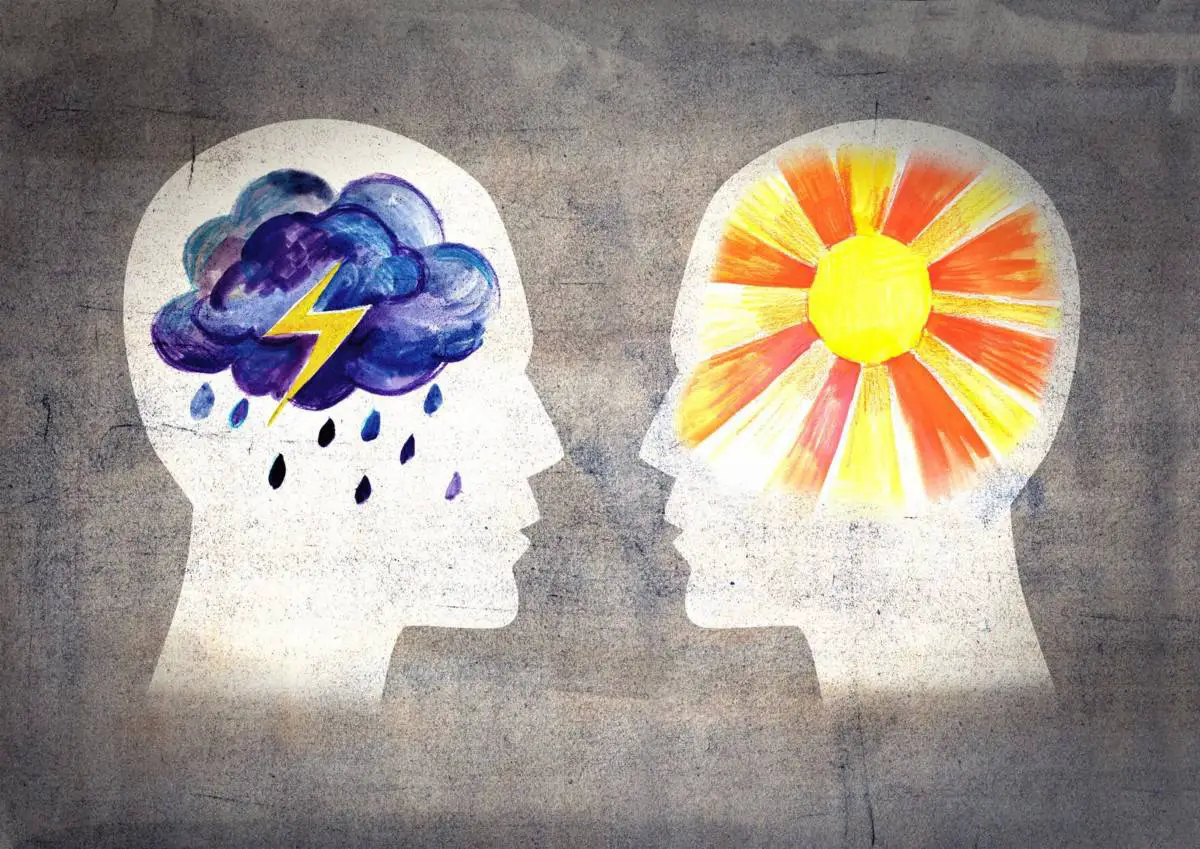How much of your behavior and your life decisions are you really in control of ? How many of your life decisions have been controlled with-out you even realizing it?
Likely you’ve heard of the term “subconscious thoughts”, but what about “unconscious thoughts”?
What’s the difference? Well, you can control your sub-conscious thoughts, but your unconscious thoughts can control you.
However, it is possible to tap into your unconscious mind.
Let’s dive in.
What is Subconscious vs. Unconscious vs. Conscious Minds
I’ve always known when I’m consciously aware of something. But what’s the difference between your sub-conscious and unconscious mind?
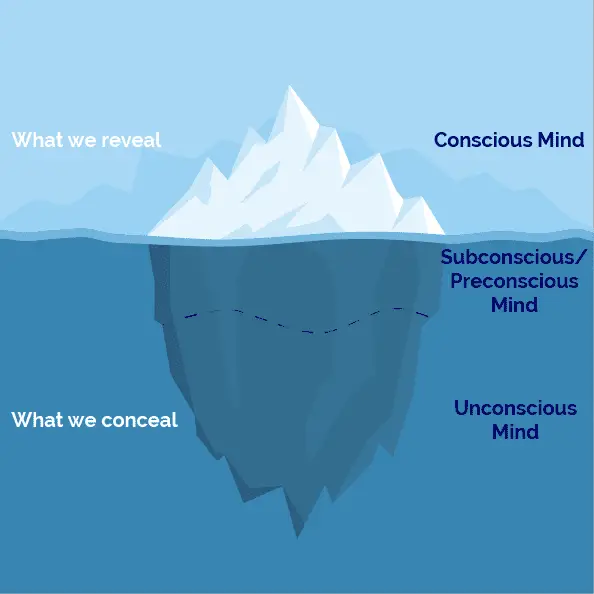
Conscious Mind –
Your conscious mind is everything you are aware of and thinking about right now. It is your awareness of the world around you.
Sub-Conscious Mind –
Your sub-conscious mind (also known as pre-conscious) is like a huge storage bank. The subconscious mind contains information that you’re not currently thinking about, but that you can draw into your awareness with a conscious effort.
For example breathing is a sub-conscious behavior. You don’t actively think about your breathing, but when you pull breathing into your active awareness you can control it.
Unconscious Mind –
The unconscious mind is made up from automatic process that the conscious mind cannot access because they happen underneath conscious awareness.
For example, the unconscious mind contains suppressed thoughts, feelings, and emotions which may effect everyday behavior with-out us being aware of it.
Another example would be childhood trauma.
Understanding And Unlocking The Power of Your Unconscious Mind
The unconscious mind drives most of what we do, but due to the nature of being “unconscious” we’re not aware that it drives what we do.
Fortunately, once you have a better understanding of the unconscious mind, you can tap into it to unleash your untapped potential.
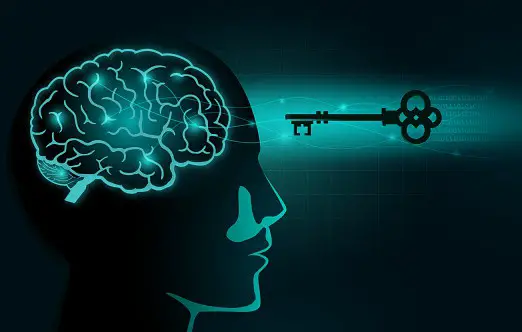
Understanding the Unconscious Mind
For many people, the unconscious mind holds onto things that we don’t want to think about. For example, judgments about ourselves, unresolved & suppressed emotions, childhood trauma, PTSD, ect.
We often suppress these thoughts and feeling with rational thought from our conscious mind, often convincing ourselves not to think about it, or to just forget about the thoughts bubbling up from our unconscious mind.
Unfortunately our brains don’t work that way.
According to a famous study by Dr. Daniel Wegner, a psychology professor at Harvard University, if you try to push away a thought on some topic, you will end up having more thoughts about that topic. The same effect happens when you try to push away emotional thoughts.
I like to think of this like an ice cube in a glass.
If you push an ice cube to the bottom of a glass, it will stay there for a brief second, before returning right back to the top.
The same is true with pushing down thoughts and feelings in
to your unconscious mind.
Eventually they will pop right back up into your conscious mind.
Eventually they will pop right back up into your conscious mind.
What’s fascinating is that all the information in the unconscious mind drives most of what you do everyday. Neuroscientist David Eagleman has conducted new research and has found that 95% of your decisions are made by your unconscious mind.
Unlocking & Receiving Communication From Your Unconscious Mind
If your unconscious mind controls over 90% of your decision making ‘behind the scenes’ with-out you even being consciously aware of it, then how do you tap into your unconscious?

As touched on above, the conscious mind is what your actively thinking about, your subconscious is storage for what you know, but not actively thinking about (but could think about with a conscious effect).
However, your unconscious is not accessible through typical conscious thought. Active thought can actually block your unconscious thoughts. But there are ways to access it by tricking your mind.
The goal when tapping into you unconscious mind is to increase your level of self-awareness. By increasing self-awareness it will give you a better understanding of what’s really driving your decision making.
The key to becoming more self-aware and tapping into your unconscious mind is getting your conscious mind and conscious thoughts out of the way. Your conscious thoughts are distractions from understanding your unconscious thoughts.
When the conscious mind is active, the unconscious mind is blocked. So to access the unconscious mind you must free your mind from conscious thought while simultaneously letting your unconscious thoughts ‘bubble to the top’ where you can grab them, process them, and analyze them.
7 Tips For Tapping Into Your Unconscious Mind

- Understanding Your Triggers – Do you have any emotional triggers? From my experience, your family is often a great place to start when looking for ‘triggers’. Childhood trauma, PTSD, and hits to your ego are also common sources of unconscious emotional triggers.
By identifying your triggers it gives you awareness and with awareness comes the opportunity to reflect upon your triggers.
Dr. Deepak Chopra MD, founder of The Chopra Foundation, says that “Awareness is the birthplace of possibility. Everything you want to do, everything you want to be, starts here.”
Personally, it wasn’t until I realized where my emotional trigger came from, that I was able to realize my ‘daily actions’ were actually ‘reactions’ to my unconscious instead of calm and collected conscious actions. - Free Writing – it might sound ‘gimmocky’ but “free writing” is a great way to try and unlock your unconscious thoughts.
You can practice free writing or ‘blind writing’ by closing your eyes and just writing whatever comes to mind. Don’t worry about grammar, sentence structure, spelling or anything else “proper”, just let your brain flow and write it out.
It is believed that by writing quickly, with-out thinking, it forces the conscious mind to pause for the unconscious mind. This exercise allows us to tap deep into our unconscious thinking.
After a few minutes of free writing open your eyes and see what you came up with. Again, the results are an opportunity for reflection and analysis for deep meaning. - Art Therapy – Art can be anything, it can drawing, painting, sculpting, wood working, playing music, ect. The goal of art therapy is to free your mind from conscious thought.
When your brain is focused on creating it creates a distraction for your conscious mind which provides your unconscious mind with an opportunity to bubble to the surface. I personally am not a huge art guy, but I enjoy creating digital music as a means of artistic creation.
Typically I bring a note pad with me to jot down ‘random thoughts’, epiphanies, ideas, and emotions that spring out of my unconscious mind while I’m creating. I don’t stop the creative process to analyze, but once written down I come back later to reflect on my bubbled up thoughts and emotions. - In & Out Listening – If you’ve ever listened to a lengthy talk about anything, you’ve probably experienced your mind wandering. With “in-and-out-listening” this is the point. Let your mind wander, and as soon as it does write down what thoughts came about. Keep doing this and after each thought is written down, return your focus towards the talk.
When listening to a lecture or podcast (any long form talk) I keep a notepad nearby to write down fleeting thoughts which I come back to later to analyze and reflect upon. - Compassionate Attention – Compassionate attention is a technique of consciously directing your attention and focus onto thoughts and emotions with the intent at looking at them compassionately. This can eb either positive or negative emotions. (usually negative emotions are the ones most suppressed in the unconscious mind)
The goal of focusing on compassionate attention is to let go of old patterns, beliefs, fears, and memories of unpleasant experiences in your life. Ultimately, this should give you more opportunity to experience your life with less drama and pain. - Mindfulness – Mindfulness is a ‘crowd favorite’ in the world of consciousness, self-awareness, and self-discovery. Mindfulness is the practice of controlling your thoughts and being ‘present’ int the moment with-out any distracting thoughts.
Through mindfulness you can increase your ability to control your thoughts. And with an increased ability to control your thoughts, you’ll gain a stronger ability to notice, record, reflect upon, and analyze your unconscious thoughts. - Sensory Deprivation Tank – The goal of a sensory depravation tank is the remove all external distractions from your environment in order to let your mind open up freely.
My personal experiences with float tanks have been amazing. With-out external distractions your mind is free to explore the depths of unconscious thoughts as they float through your brain like a flowing river.
Reprogramming Your Unconscious Mind: Is It Possible ?
Just like updating your computer to the newest version of Windows or Mac operating software, you can update your unconscious brain processing software as well.
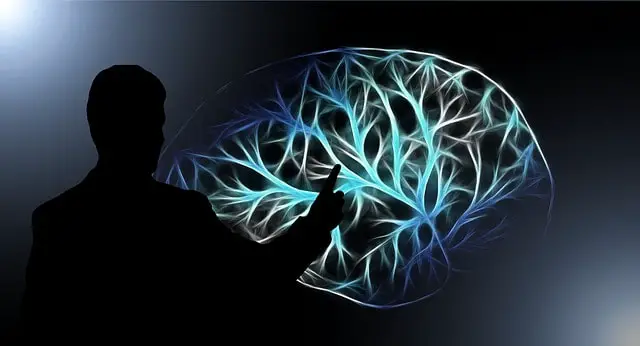
We’re trained through our life experiences to think, act, and feel certain ways. But no-one has the same life experiences, so some of us need to re-boot and refresh our minds in order to approach life from a new direction.
As long as I’m using computer analogies, who couldn’t use a “disk-defrag”, disk clean-up, and a system update to keep your mind running smoothly.
Everybody has (to a degree) some repressed emotions, thoughts, and most us of have experienced a form of trauma. Obviously some people more severe trauma than others. But to heal or just move forward in life, reprogramming your unconscious mind is a great option.
8 Actionable Tips To Help Reprogram Your Unconscious Mind
I’m not going to give you some BS tips like “just think positive vibes man”. You can find that on most other websites.
I’ve researched and tried all sorts of tips and here are the ones that work for me. All of these tips are things you can put into action right now.

- Practice Affirmations – This may sound a little “hokey” at first, at least that’s what I thought, but practicing positive affirmations is a practice that is thousands of years old and actively being taught in our military today as a means of providing “mental armor” and coping with PTSD.
Basically an affirmation is just positive self talk. But in order to reprogram your subconscious mind with affirmations, it takes repetition. Do this everyday.
For example you may wake up in the morning and repeat the affirmation “I Choose To Be Happy” 10 times (or maybe 30 times) while looking in the mirror before you start your day. The first day you’ll probably forget by the time you get to your car.
The second day, you may remember this when someone cuts you off in traffic. But after a month of repetition, you may actually notice a dramatic difference in your overall level of happiness.
There are thousands of affirmations to choose from or you can create your own. The goal with choosing an affirmation is to make it highly personal and motivating.
The real key with affirmations is to choose something positive which through repetition, you hope to drill into your unconscious mind so that in times of need, it bubbles up right into your conscious mind. - Write Your Goals Down – My mind can be a circus sometimes. With cell phone notifications and social media addictions on the rise, our world has never been more distracting. Our minds are working overtime trying to stay focused.
Writing down your goals might seem overly simple, but by writing down your goals it hacks to your brain to stay on task.
Don’t just write one goal and be done with it. Break down your goal on paper. What steps do you need to take to reach your goal? Write them down. What steps do you need to take in order to reach the steps you need to take in order to reach your goal? Write them down.
Having a goal in your head is great, but writing it down helps your brain visualize your goal from a new perspective. By writing it down, you’re more likely, based on my experience, to take action steps towards achieving it.
Writing down your goals helps eliminate self-doubt and engraves the goal into your unconscious mind. - Hypnotherapy or Self-Hypnosis – According to psychologist and Certified Hypnotist Michael Salerno, “Hypnosis works by helping you reprogram your self-sabotaging, self-defeating behaviors and thoughts that keep you from achieving your goals.”
Hypnosis is typically used to help people stop smoking or stop eating, but it can be utilized for virtually anything you want to either eliminate or improve upon in your life.
Even though I have never tried hypnosis, I wanted to put it on the list because the underlying principle behind hypnosis goes hand-in-hand with everything that I’ve experienced, read about, and written about.
From Michaels experience, most habits take 3-4 weeks to overcome. Your subconscious mind is like a giant sponge that absorbs everything around it. These thoughts and images that your subconscious mind absorbs become part of your unconscious mind, which then become part of your belief system. In other words your thoughts create your reality and by reprogramming your thoughts, you can change your reality. - Psychedelic Therapy – Psychedelic therapy may be a bit controversial, and is only legal in certain states and cities in the United States. But the results speak for themselves.
Anyone who’s taken psychedelics or undergone psychedelic therapy will have a difficult time explaining how it feels because the feeling can sometime be overwhelming, but the end results are overwhelmingly positive.
According to Harvard Medical …
“Researchers have recommended that the federal government reclassify these substances in order to facilitate future efforts”
The initial results were so profound that in the mental health-care company “Compass” was awarded “breakthrough therapy” designation (and a fast track review) by the FDA for studies in psilocybin treatment of depression.
Psychedelic’s break-down the construction of the conscious mind bringing your sub-conscious & unconscious mind to the forefront of your consciousness where you become overtly aware of your unconscious programming.
My personal experience has been so positive that I bough stocks in 5 psychedelic companies which I plan to hold forever as the psychedelic industry expands.
Did ancient civilization use psychedelic substances? You bet they did. Check this out. - Biohack Your Mind With Binaural Beats – I’m actually listening to binaural beats right now as I’m writing this. Binaural Beats help me focus and stay on task.
As published by Colorado State University, binaural beats improve cognitive function, making listeners brains better at processing, learning, and retaining new information, while also improving mood and decreasing stress and anxiety.
Binaural beats are sounds, and soundtracks tuned to specific frequencies which resonate in the brain to produce different effects. The most common binaural beats are for studying, but they can also be found for increasing adrenaline, inducing sleep, and meditation.
Interestingly enough, many ancient sites from the Egyptians, to the Mayans, to Neolithic sites have been discovered to resonate a specific frequencies similar to binaural beat frequencies.
The idea behind binaural beats is to circumnavigate your conscious mind to provide direct access into your subconscious and unconscious mind. - Repetition, Repetition, Repetition. . .ect – This isn’t a specific tip, but more of a general reminder and key expectation setter.
It’s important to remember that your unconscious mind was formed over years and has been reinforced over time by your thoughts, fears, and deep emotional attachments. Reprogramming your unconscious mind doesn’t happen overnight.
Research has shown that it normally takes anywhere from 3 weeks to 8 months to break a habit. Reprogramming your unconscious mind is no different. The more repetition you practice, the easier and faster you can reprogram your unconscious.
If you don’t see results immediately or even after a few weeks – stick with it. - Awareness of Negative Self-Talk – Just like positive affirmations are meant to re-program your brain in a positive way, you can easily fall into the trap of negative affirmations which can reprogram your brain into a downward spiral.
This is one of the most difficult things I’ve dealt with (and am currently dealing with).
negative sayings like “I’m too stupid”, or “I’m not smart enough”, or “I always fail”, or “I can’t do this” can easily seep into your unconscious mind and sabotage you from the inside out.
When times get difficult (and they always do at some point) your unconscious thoughts may bubble to the surface.
If you practice positive affirmations, in times of difficulty your unconscious might save you with the thought of “you got this”.
But if you practice negative affirmations, in times of difficulty your unconscious mind might sabotage you by reminding you that “you’re not smart enough”.
If you become aware of the harm negative self-talk can cause, then you can catch yourself and stop negative self-talk in its tracks before it seeps into your unconscious mind. - External & Environmental Influences – Similar to negative self-talk, your external environment can have a huge impact on your unconscious mind.
Psychology expert, author, and Yale Professor Dr. John Bargh, published a study in 2008 which concluded that the unconscious mind is a system that handles subliminal stimulation from the environment.
This study reinforces the importance that your external influences have on your unconscious thoughts.
Try to control the amount of negative external influences in your life. Maybe try turning off the news, listen to a new genre of more upbeat music, surround yourself with more positive people.
Basically, try and be more aware of negative vibes in your life and do your best to limit them, because your mental health and unconscious mind might depend on it. If you’re aware of it you can control it.
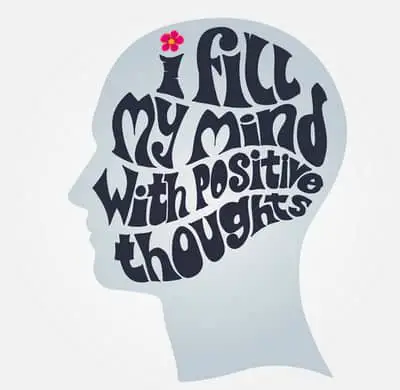
Conclusion: Controlling Your Unconscious Mind
What do you want out of life? Are you hitting your goals? Are you genuinely happy with your life? Are you stuck?
I’m unsure where I lie on most of these, but by increasing my understanding of my mind and increasing my general self-awareness I feel that I’m certainly making progress in life gaining a deeper level of happiness and having more of a purpose by contributing more to society.
But it’s not until you recognize and understand how something works that you’re able to do something about it. By recognizing unconscious thoughts and patterns it will give you the ability to learn more and have more control over your life.
Hopefully this article was helpful. Please let me know what you think.
Loved what you read?
Hit that share button and let the world in on the secret – we’d be thrilled!
Got thoughts? We’re all ears for your feedback, corrections, or a good old chat. Don’t be shy; drop us a line.
And hey, don’t miss out on our curated list of must-reads in the recommended books section.
Big thanks for diving in with us today!


